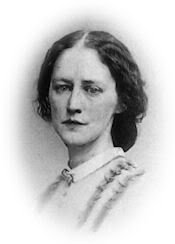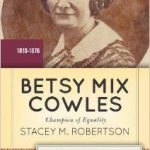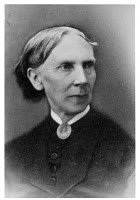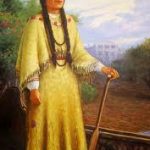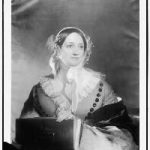Civil War Nurse and Educator
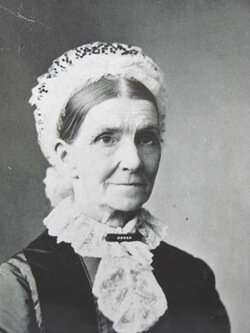 Eliza Emily Chappell Porter was the first public school teacher at Fort Dearborn in Chicago. She established normal schools to train high school graduates to be teachers. As a member of the U.S. Sanitary Commission during the Civil War, she established hospitals for wounded soldiers and distributed supplies. The Porter home in Green Bay, Wisconsin was the last stop on the Underground Railroad before slaves crossed Lake Michigan into the safety of Canada.
Eliza Emily Chappell Porter was the first public school teacher at Fort Dearborn in Chicago. She established normal schools to train high school graduates to be teachers. As a member of the U.S. Sanitary Commission during the Civil War, she established hospitals for wounded soldiers and distributed supplies. The Porter home in Green Bay, Wisconsin was the last stop on the Underground Railroad before slaves crossed Lake Michigan into the safety of Canada.
Early Years
Eliza Emily Chappell was born November 5, 1807 in Geneseo, New York, the eighth child of Robert and Elizabeth Kneeland Chappell. Elizabeth died from complications of childbirth. Already burdened with seven young children at home, Robert sent Eliza to live with her mother’s niece, Mrs. Bower of Franklin County, New York. Bower wanted to adopt Eliza, but Robert refused. Eliza returned home to Geneseo when she was twelve.
Career in Education
At age fourteen, she joined the Presbyterian church, and boarded with a minister’s family in Rochester, New York at age of fifteen and attended school. She was also an avid reader. By age sixteen, Eliza was teaching at a nearby school. She believed it was important to educate toddlers, and opened a school for small children in 1828.
In Rochester, Eliza met Robert Stuart and his wife, who wanted a private tutor for their children. Stuart was a partner of John Jacob Astor at Mackinac Island, Michigan. Eliza studied the Infant School system, and in June 1831, she traveled to the frontier settlement on Mackinac Island. She soon opened a school there for Indian children.
On June 19, 1832, Porter wrote this about her teaching:
This day closes my third term, have had an examination in which the parents and friends of the school have evinced great interest. Could my dear friends at home have seen me surrounded by 54 (the present number of pupils) precious immortals, many of whom within nine months have learned to read and recite passages of scripture – could you have looked in upon us this morning, and followed us in our exercises I doubt not your hearts would have filled to overflowing.
Eliza was a thin, frail woman, but never idle. After traveling east to recover from an illness, she solicited funds and established schools at St. Ignace, Michigan in 1833, and the small settlement of Chicago.
Marriage and Family
In June 1835, Eliza Chappell married the Reverend Jeremiah Porter, a Presbyterian clergyman from Chicago, Illinois. The couple had first met on Mackinac Island while working to establish a school. On January 4, 1851, the Porters eventually settled in Green Bay, Wisconsin. Over the ensuing years, Porter gave birth to nine children; six reached adulthood.
The Porters in the Civil War
The Porters were living in Chicago when the Civil War began. During summer 1861, Eliza Porter helped establish hospitals and carried supplies needed by sick and wounded soldiers at Cairo, Illinois. The following October, Porter became office manager of Northwestern Sanitary Commission, the Chicago chapter of the U.S. Sanitary Commission, which solicited food, medical dressings and other supplies for use in frontline hospitals.
In April 1862, Eliza Porter gave up office work for field service. She escorted a group of volunteer nurses to Cairo and in nearby Mound City she helped organize hospitals and direct the work of caring for the large number of casualties from the Battle of Shiloh (Pittsburg Landing). Her husband was commissioned Chaplain of the First Illinois Light Artillery, was then working in the hospitals at Cairo, Illinois.
After Shiloh, Porter decided that she would be more useful in the field. At Cairo, she met Mary Jane Safford, who was called the Cairo Angel. Eliza’s husband, Reverend Jeremiah Porter, had been commissioned as Chaplain of the First Illinois Light Artillery, was then at Cairo; he had been ordered to work in the hospitals there. The two women, Reverend Porter and various surgeons cared for seven hundred men from the fields of Shiloh, and then transferred them to the hospitals at Mound City, Illinois.
Soon after, Porter went to Pittsburgh Landing, where she received an order for several female nurses from the Medical Director, Dr. Charles McDougal, for his department. She hurried to Chicago, rounded up the volunteers, accompanied them to Tennessee, and placed them with Mary Ann Bickerdyke, who had been with the wounded since the Battle of Shiloh.
Memphis
From there Porter went to Corinth, Mississippi, which had just been taken by General Grant. She was accompanied by several ladies from Chicago who came to tend the sick and wounded. At Corinth, Eliza joined her husband, and traveled to Memphis, Tennessee, with him after he was ordered to join his regiment there.
While at Memphis, Porter became deeply interested in the welfare of the escaped slaves and their families who were gathered there. Receiving aid from friends in the North, she established a school for African American children, and spent her leisure time teaching. The school flourished, and others entered into the work, and other schools were established. Teaching, feeding, and clothing the former slaves kept Eliza busy at Memphis until June 1863.
After her schools had become well-established, Mrs. Porter felt the need to again devote herself exclusively to the soldiers, a large number of whom were languishing in Southern hospitals in an unhealthy climate. After a short stay at Vicksburg, Eliza returned to Illinois to plead with Governor Yates to bring home his disabled soldiers, then went back, by way of Louisville and Nashville, to Huntsville, Alabama, where she met and worked with friends from Chicago, and again Mrs. Bickerdyke.
After a few weeks spent there in comforting the sick, Eliza followed the army to Chattanooga, Resaca, Kingston, Allatoona Pass, Marietta, and Atlanta. The following letter was extracted from the Report for January and February 1864 of the Northwestern Sanitary Commission:
Chattanooga, January 24, 1864
I reached this place on New Year’s Eve, making the trip of the few miles from Bridgeport to Chattanooga, in twenty-four hours. New Year’s morning was very cold. I went immediately to the Field Hospital about two miles out of town, where I found Mrs. Bickerdyke hard at work, as usual, endeavoring to comfort the cold and suffering, sick and wounded. The work done on that day told most happily on the comfort of the poor wounded men.The wind came sweeping around Lookout Mountain, and uniting with currents from the valleys of Mission Ridge, pressed in upon the hospital tents, overturning some, and making the inmates of all tremble with cold and anxious fear. The cold had been preceded by a great rain, which added to the general discomfort.
Mrs. Bickerdyke went from tent to tent in the gale, carrying hot bricks and hot drinks to warm and to cheer the poor fellows. “She is a power of good,” said one soldier. “We fared mighty poor till she came here,” said another. “God bless the Sanitary Commission,” said a third, “for sending women among us!” The soldiers fully appreciate “Mother Bickerdyke,” as they call her, and her work.
Mrs. Bickerdyke left Vicksburg at the request of General Sherman, and other officers of his corps, as they wished to secure her services for the then approaching battle. The Field Hospital of the 15th (Sherman’s) Army Corps, was situated on the north bank of the Genesee river, on a slope at the base of Missionary Ridge, where, after the struggle was over, seventeen hundred wounded and exhausted soldiers were brought.
Mrs. Bickerdyke reached there before the din and smoke of battle were well over, and before all were brought from the field of blood and carnage. There she remained the only female attendant for four weeks. Never has she rendered more valuable service. Dr. Newberry arrived in Chattanooga with Sanitary goods, which Mrs. Bickerdyke had the pleasure of using.
The Field Hospital was in a forest, about five miles from Chattanooga, wood was abundant, and the camp was warmed by immense burning “log heaps,” which were the only fireplaces or cooking-stoves of the camp or hospitals. Men were detailed to fell the trees and pile the logs to heat the air, which was very wintry. And beside them Mrs. Bickerdyke made soup and toast, tea and coffee, and broiled mutton, without a gridiron, often blistering her fingers in the process.
A house in due time was demolished to make bunks for the worst cases, and the brick from the chimney was converted into an oven, when Mrs. Bickerdyke made bread, yeast having been found in the Chicago boxes, and flour at a neighboring mill, which had furnished flour to secessionists through the war until now.
Great multitudes were fed from these rude kitchens. Companies of hungry soldiers were refreshed before those open fireplaces, and from those ovens. On one occasion, a citizen came and told the men to follow him, he would show them a reserve of beef and sheep which had been provided for General Bragg’s army, and about thirty head of cattle and twenty sheep was the prize.
Large potash kettles were found, which were used over the huge log fires, and various kitchen utensils for cooking were brought into camp from time to time, almost every day adding to our conveniences. After four weeks of toil and labor, all the soldiers who were able to leave were furloughed home, and the rest brought to the large hospital where I am now located. About nine hundred men are here, most of them convalescents, and waiting anxiously to have the men and mules supplied with food, so that they may have the benefit of the cars, which have been promised to take them home.
There was great joy in the encampment last week, at the announcement of the arrival of a train of cars from Bridgeport. You at home can have little appreciation of the feelings of the men as that sound greeted their ears. Our poor soldiers had been reduced to half and quarter rations for weeks, and those of the poorest quality. The mules had fallen by the wayside from very starvation.
You cannot go a mile in any direction without seeing these animals lying dead from starvation – and this state of things had to continue until the railroad was finished to Chattanooga, and the cars could bring in sustenance for man and beast. You will not wonder then at the huzzas of the men in the hospitals and camps, as the whistle of the long looked for train was heard.
The most harrowing scenes are daily witnessed here. A wife came on yesterday only to learn that her dear husband had died the morning previous. Her lamentations were heart-breaking. “Why could he not have lived until I came? Why?” In the evening, came a sister, whose aged parents had sent her to search for their only son. She also came too late. The brother had gone to the soldier’s grave two days previous. One continued wail of sorrow goes up from all parts of this stricken land.
I have protracted this letter, I fear, until you are weary. I write in great haste, not knowing how to take the time from pressing duties which call me everywhere. Yours, etc.,
Eliza C. Porter.
Excerpts from Eliza’s journal, kept during this period, were published without her knowledge in the Sanitary Commission Bulletin. The diary was begun on May 15, 1864, while she was following Mrs. Bickerdyke to Ringgold, Georgia.
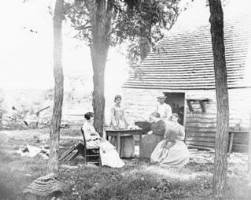 Georgia
Georgia
Together they arrived at Sugar Creek, where but two miles distant the battle was raging, and spent the night at General Logan’s headquarters, within hearing of its horrible sounds. They were not being permitted to go on the field, but cared for the wounded as they were brought to the rear.
Again, writing from Alatoona, Georgia, on June 14th:
I have just visited a tent filled with ‘amputated cases,’ They are noble young men, the pride and hope of loving families at the North, but most of them are so low that they will never again return to them. Each had a special request for “something that he could relish,” I made my way quickly down from the heights, where the hospital tents are pitched, and sought for the food they craved.
I found it among the goods of the Sanitary Commission – and now the dried currants, cherries, and other fruit are stewing; we have unsoldered cans containing condensed milk and preserved fruit – and the poor fellows will not be disappointed in their expectations.
At the close of General Sherman’s campaign, Mrs. Porter finished her army service by caring for the travel-worn and weary soldiers as they came into camp at Washington where, with Mrs. Stephen Barker and others, she devoted herself to the distribution of supplies, attending the sick, and in various ways comforting and relieving all who needed her aid.
Army Life
When Eliza and her husband moved to Brownsville, Texas, in 1868, she reopened the coeducational Rio Grande Seminary that she had founded on an earlier visit. Over the next 15 years, she conducted schools there, at Fort Sill, Oklahoma and at Fort D.A. Russell, Wyoming, as her husband was transferred.
Eliza Porter died on January 1, 1888, in Santa Barbara, California.
SOURCES
Woman’s Work in the Civil War
Eliza Chappell Porter: A Memoir
Wikipedia: Eliza Emily Chappell Porter
